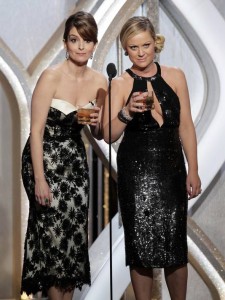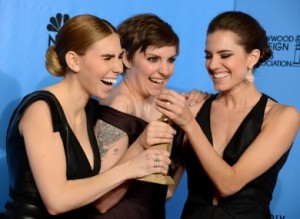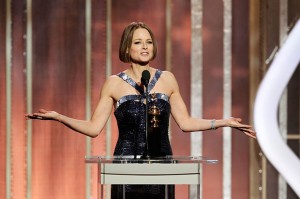Golden Globes 2013: Going Home With Jodie Foster
 This past December, a colleague and I gave a guest lecture on women in comedy. After an abbreviated survey of women’s contributions to American television comedy, we used the following questions as a guide: “Who gets to be funny?,” “Funny to whom?,” “Is it funny to be a feminist?,” and “Is it feminist to be funny?”
This past December, a colleague and I gave a guest lecture on women in comedy. After an abbreviated survey of women’s contributions to American television comedy, we used the following questions as a guide: “Who gets to be funny?,” “Funny to whom?,” “Is it funny to be a feminist?,” and “Is it feminist to be funny?”
We used two awards’ show moments as bookends. We opened with a clip of Amy Poehler standing in solidarity with her fellow nominees at the 2011 Emmys. We closed on an image of Poehler and Tina Fey, who were selected to host the 2013 Golden Globes. We wondered what it meant for the two actresses – who were part of a television moment that once again illustrated how they’ve made careers out of using comedy to negotiate feminism – to rush the stage in 2011 and (wo)man the podium in 2013. Was it a big deal for two women to host an awards show, a duty often bestowed upon their male contemporaries? Was it important that they follow in the footsteps of the co-creator of The Office who offended celebrities’ delicate sensibilities for three years? What kind of compromises would they make as hosts? Who was absent by virtue of their presence? Did it matter?
I think so. Fey and Poehler made clear in their opener at last night’s 70th Golden Globe Awards that they were going to keep the ceremony moving as they blithely delivered jokes about (and at) Ricky Gervais, Lena Dunham’s nudity, Daniel Day Lewis’ acting, Kathryn Bigelow’s marriage to James Cameron, Quentin Tarantino (eek!), Anne Hathaway (ouch), and their responsibilities as hosts (including having to go without pie for six weeks). If some considered this to be a tame outing for the pair, I was often unclear when Gervais was speaking truth to power and when he was just pleased with himself for being mean. Their routine lacked some of the feminist bite of their best work as Weekend Update anchors, but the women behind Liz Lemon and Leslie Knope make television out of picking your battles. Plus, I get a kick out of friends making each other laugh. For every moment they cracked themselves up, whether they were putting on false teeth and mustaches, holding hands expectantly with Jennifer Lopez, sitting on George Clooney’s lap, getting Glenn Close to play drunk, or chiding Dunham’s youth, I imagined them chuckling through rewrites, rehearsals, and late-night phone calls.
Some might be tempted to claim that the Golden Globes helped raise the banner for women. Not so fast. Jessica Chastain gave an empowered speech that compared her character in Zero Dark Thirty to its director, two women who let their work and not their gender speak for them. I was especially moved by Chastain’s willingness to gently challenge Bigelow by giving her credit for helping allow for a wider range of roles for women in the industry. But I have to pause at the thought that social progress might have anything to do with women enacting torture – a horrifying responsibility Claire Danes seemed to shrug off in her acceptance speech, which also nodded toward (certain) women’s increased visibility on the small screen.
 “Funny to whom?” is a key question for Dunham’s rise. Girls is a promising comedy, but I don’t want to overburden the show with unearned societal import and want badly for other comedic voices to benefit from the platform Dunham has been given. The show caught flak for its invocation of a select identity group that isn’t totalizing for the many people who exist outside of it. Like many 26 year olds, Dunham is frustratingly inconsistent, responding to criticism against the show, its staff, and her own appeals to white privilege and hipster racism with apologies and correctives that waver between defensive, tongue-in-cheek, and humbled.
“Funny to whom?” is a key question for Dunham’s rise. Girls is a promising comedy, but I don’t want to overburden the show with unearned societal import and want badly for other comedic voices to benefit from the platform Dunham has been given. The show caught flak for its invocation of a select identity group that isn’t totalizing for the many people who exist outside of it. Like many 26 year olds, Dunham is frustratingly inconsistent, responding to criticism against the show, its staff, and her own appeals to white privilege and hipster racism with apologies and correctives that waver between defensive, tongue-in-cheek, and humbled.
Dunham has always been ambivalent about Girls‘ scope. Her comedic sensibility is keyed into a distinct milieu. But during her first acceptance speech, she dedicated her win to “every woman who’s ever felt like there wasn’t a space for her.” This phrase stuck out, as Don Cheadle was the only person of color to win a Golden Globe this year. During the broadcast, Jamie Foxx presented Django Unchained, a film in which he played the title character, wasn’t nominated, and saw Tarantino and Christopher Waltz collect their awards and Leonardo DiCaprio get a nod. How white is that? Obviously, this isn’t Dunham’s fault. But she’s a recognized, powerful member of the industry now. I hope she works to find room for “every woman” in her own work and uses her influence to give the floor to them.
 Jodie Foster answered the call to female empowerment with an ellipsis, a question mark, and the start of another sentence. The actress-director-Yale alumna almost came out, prompting Melissa Harris Perry to compare her Cecil B. DeMille acceptance speech to Hannah Arendt’s political theory. She implied that she came out a lifetime ago when she was a younger, more uncertain person. She made herself visible to people she knew off-camera and not to the millions watching at home. She thanked her former partner and their two sons. She insisted on her privacy, an intangible for a former child star. She may have also suggested that the necessity to come out in public reinforces heteronormativity. And, very tenderly, she said she loved her ailing mother. She also turned Honey Boo Boo into a straw man and expressed tenderness for Mel Gibson, which I cannot fathom. Slippery rhetoric aside, Foster made clear that her life is none of our business. It’s a contradictory statement to make when receiving a lifetime achievement award, yet a bold claim.
Jodie Foster answered the call to female empowerment with an ellipsis, a question mark, and the start of another sentence. The actress-director-Yale alumna almost came out, prompting Melissa Harris Perry to compare her Cecil B. DeMille acceptance speech to Hannah Arendt’s political theory. She implied that she came out a lifetime ago when she was a younger, more uncertain person. She made herself visible to people she knew off-camera and not to the millions watching at home. She thanked her former partner and their two sons. She insisted on her privacy, an intangible for a former child star. She may have also suggested that the necessity to come out in public reinforces heteronormativity. And, very tenderly, she said she loved her ailing mother. She also turned Honey Boo Boo into a straw man and expressed tenderness for Mel Gibson, which I cannot fathom. Slippery rhetoric aside, Foster made clear that her life is none of our business. It’s a contradictory statement to make when receiving a lifetime achievement award, yet a bold claim.
But her statement could still be turned into a (light) joke, because words are malleable. During their sign-off, Poehler told the crowd that she and Fey were going home with Foster. To start a Judith Butler reading group over cocktails? If only. To lobby for Mindy Kaling’s nomination next year? I hope so, and not in isolation. Some of us were on stage this year. Congratulations. What’s next?


